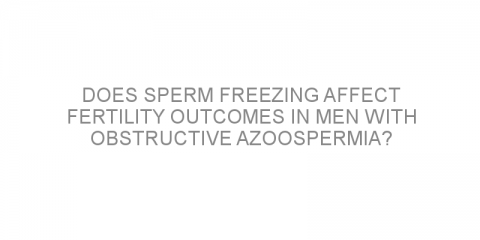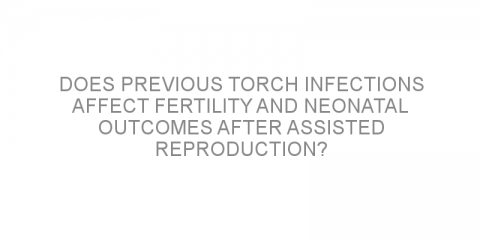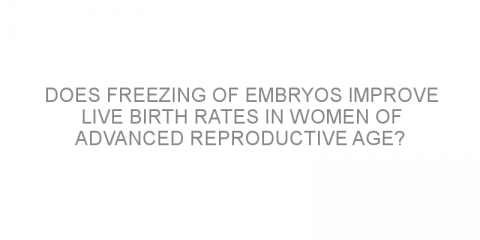In a nutshell This study investigated if sperm cryopreservation (freezing) affects fertility outcomes for men with obstructive azoospermia (OA; lack of sperm cells in the semen due to a blockage). The authors found that the clinical pregnancy rate (CPR) was lower with the use of frozen vs fresh epididymal sperm. Some background There...
Read MoreInfertility Posts on Medivizor
Is natural cycle or hormone replacement cycle associated with better pregnancy rates in women undergoing frozen embryo transfer?
In a nutshell This study compared natural cycle (NC) or hormone replacement cycle (HRC) in terms of fertility outcomes in women undergoing frozen embryo transfer (fzET). They found that fertility outcomes were similar with NC or HRC. Some background Assisted reproductive technology (ART) is used to treat infertility. ART includes...
Read MoreComparing IVF protocols and genetic testing outcomes
In a nutshell This study looked at two protocols for in vitro fertilization (IVF) using different timing of medications to suppress the body’s own hormones. It found that patients using a long-acting protocol had fewer embryos with unusual chromosomes (genetic material). Some background Women are born with most of their oocytes (eggs) already...
Read MoreIs testosterone replacement therapy more common in men undergoing assisted reproduction?
In a nutshell This study investigated the rate of testosterone replacement therapy (TRT) in men undergoing assisted reproduction (AR). They found that men undergoing AR were more likely to need TRT. Some background Low testosterone (T) is becoming increasingly common worldwide. Low T in men is associated with a number of conditions. This...
Read MoreDoes previous TORCH infections affect fertility and neonatal outcomes after assisted reproduction?
In a nutshell This study investigated if previous TORCH infections affect outcomes during assisted reproduction (AR) such as in vitro fertilization (IVF) or intracytoplasmatic sperm injection (ICSI). They found that there was no link between previous TORCH infections and negative fertility/neonatal outcomes. Some background A healthy...
Read MoreDoes antioxidant supplementation improve subfertility?
In a nutshell This study reviewed if antioxidant supplementation (AOS) improves fertility outcomes. They found that AOS was not associated with better fertility outcomes. Some background Infertility is a common condition. It is diagnosed if a couple has not conceived within one year of regular intercourse. Subfertility (SF) is when a couple...
Read MoreDoes dual administration of progesterone improve outcomes with in vitro fertilization?
In a nutshell This study investigated if dual (intramuscular and vaginal) progesterone (PG) administration improves fertility outcomes in women undergoing in vitro fertilization (IVF). They found that dual PG led to similar fertility outcomes as a single intramuscular PG administration. Some background Assisted reproduction...
Read MoreThe use of mHealth to improve nutrition and lifestyle behaviors in subfertile couples undergoing assisted reproduction
In a nutshell This study was carried out to study the effectiveness of the mHealth nutrition and lifestyle coaching program Smarter Pregnancy in couples undergoing fertility treatment. The authors found that this program was effective in improving the nutrition and lifestyle behaviors in couples undergoing fertility treatment. Some background...
Read MoreDoes freezing of embryos improve live birth rates in women of advanced reproductive age?
In a nutshell This study investigated live birth rates (LBRs) in women that underwent frozen (Fz) embryo transfer (ET). They found that LBRs were higher with Fz-ET in women under 35, but there was no difference between Fz and fresh (Fr) ET in those older than 35. Some background Infertility is a common condition. Assisted reproductive technology...
Read MoreDNA fragmentation and assisted reproduction – does it affect fertility outcomes?
In a nutshell This study investigated if the DNA fragmentation index (DFI) is associated with fertility outcomes. They found that lower DFI was associated with better pregnancy rates (PRs). Some background Male infertility (MI) is a common cause of couple infertility. MI is involved in 30-50% of cases. Men with abnormal sperm...
Read MoreWhich patients can benefit from intrauterine insemination?
In a nutshell This study looked at how a couple’s health background and treatment affect intrauterine insemination (IUI) outcomes. It found that semen quality, female age, and type of fertility medications influence results. Some background IUI is often the first treatment for couples with infertility that does not have a clear cause. This...
Read MoreDoes COVID-19 influence male fertility?
In a nutshell This review looked at the effect of COVID-19 infection on male fertility. It found that COVID-19 may alter ale hormone levels and reduce sperm quality and that some men have the virus in their semen. It also found that pregnant women with COVID-19 may undergo preterm delivery. Some background The COVID-19 virus emerged in late 2019. It...
Read More















